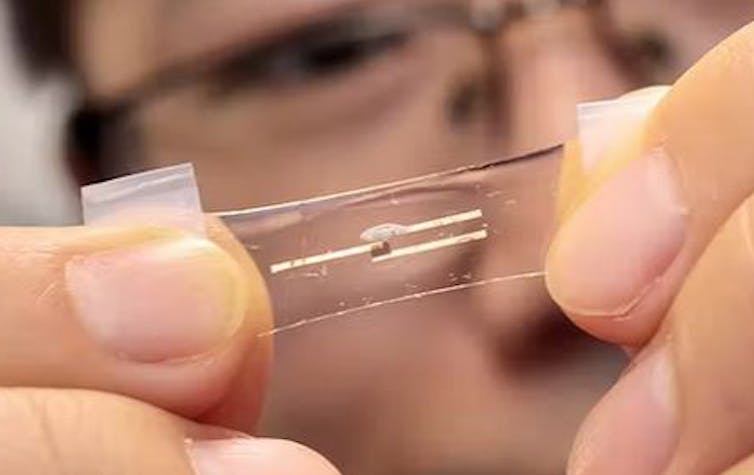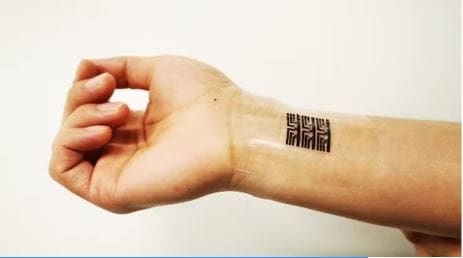The Research Brief is a short take about interesting academic work.
The big idea
My colleagues and I have developed a flexible, stretchable electronic device that runs machine-learning algorithms to continuously collect and analyze health data directly on the body. The skinlike sticker, developed in my lab at the University of Chicago’s Pritzker School of Molecular Engineering, includes a soft, stretchable computing chip that mimics the human brain.
To create this type of device, we turned to electrically conductive polymers that have been used to build semiconductors and transistors. These polymers are made to be stretchable, like a rubber band. Rather than working like a typical computer chip, though, the chip we’re working with, called a neuromorphic computing chip, functions more like a human brain. It’s able to both store and analyze data.
To test the usefulness of the new device, my colleagues and I used it to analyze electrocardiogram data representing the electrical activity of the human heart. We trained the device to classify ECGs into five categories: healthy and four types of abnormal signals. Even in conditions where the device is repeatedly stretched by movements of the wearer’s body, the device could still accurately classify the heartbeats.


UChicago Pritzker Molecular Engineering/John Zich, CC BY-ND
Why it matters
Most of the signals from the human body, such as the electrical activity in the heart recorded by ECG, are typically weak and subtle. Accurately recording these small signals requires direct contact between electronic devices and the human body. This can only be achieved by fabricating electronic devices to be as soft and stretchy as skin. We envision that wearable electronics will play a key role in tracking complex indicators of human health, including body temperature, cardiac activity, levels of oxygen, sugar, metabolites and immune molecules in the blood.
Analyzing large amounts of continuously acquired health data is challenging, however. A single piece of data must be put into the broader perspective of a patient’s full health history, and that is a big task. Cutting-edge machine-learning algorithms that identify patterns in extremely complex data sets are the most promising route to being able to pick out the most important signals of disease.
A typical approach to using machine learning to analyze real-time health data is to transmit the data wirelessly from wearable devices to a computer. But this poses challenges. Sending health data wirelessly is not only slow and consumes extra power, but it also raises privacy concerns. Our research aims to make the AI analysis of health data happen within these skinlike wearable devices, which would minimize the amount of information a device would need to transmit.
The ultimate goal is for this on-the-spot analysis to be able to send patients or health care providers timely alerts, or even one day automatically adjust medication dispensed by other wearable or implanted devices.
What other research is being done
Other research about AI processing health data collected from wearable devices has mainly involved transferring the data to computers running AI algorithms. These projects have demonstrated the potential of AI for extracting useful information from complicated health data.
The recent development of flexible neuromorphic processors is an important step toward running AI data analysis directly on wearable devices, but these flexible processors lack skinlike stretchability and softness, which makes it difficult to build them into wearable devices. In contrast, our device has the skinlike properties necessary for a wearable health monitor.
What’s next
Moving forward, researchers are likely to extend this type of AI analysis integrated in wearable devices to other types of health conditions and diseases. My lab is planning to improve our device, both to better integrate the device’s components and expand the types of machine-learning algorithms it can be used with.
Our work is a good starting point for creating devices that build artificial intelligence into wearable electronics – devices that could help people live longer and healthier lives.![]()
![]()
Sihong Wang, Assistant Professor of Molecular Engineering, University of Chicago Pritzker School of Molecular Engineering
This article is republished from The Conversation under a Creative Commons license. Read the original article.
